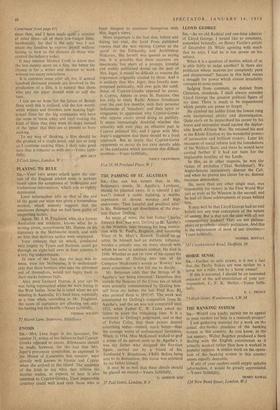SIR,—Mrs. Lena Jeger in the Spectator, De- cember 31, writes
of her failure to find Cypriot- Greeks opposed to enosis. Allowances should he made, however, for the fact that Mrs. Jeger's pro-enosis sympathies, as expressed in the House of Commons last summer, wdre already well known in Greece and Cyprus when she -arrived in the island. The tendency of the Irish to say what they believe the listener wishes, or expects, to hear is also common to Cypriot-Greeks. Their impeccable courtesy could well lead even those who at
heart disagree to associate themselves with Mrs. Jeger's views.
More important is the fact that, before and during her visit, the local Press published reports that she was visiting Cyprus as the 'guest' of the Ethnarchy and Archbishop Makarios, She herself was quoted as saying this, It is possible that these accounts arc inaccurate,' but short of a prompt, forceful and widely publicised denial on the part of Mrs. Jeger, it would be difficult to remove the impression originally created by them. And it is unlikely that Mrs. Jegcr, thus heavily com- promised politically, will ever gain the confi- dence of Cypriot-Greeks opposed to enosis, in Cyprus. Athens or even St. Pancras. One has only to study Radio Athens broadcasts over the past few months, with their personal indictments of 'treachery' and their spirit of vengeance, to appreciate why Cypriot-Greeks who oppose enosis avoid doing so publicly. It seems increasingly doubtful whether this minority will ever play an effective part in Cypriot political life, and I agree with Mrs. Jeger's suggestion that there should be a fresh approach. But to imply that Cypriot-Greek opponents to enosis do not exist merely adds to the confusion which surrounds this difficult problem.—Yours faithfully, NANCY C.RAWslIAW
Flat 38, 88 Portland Place, W.1


































 Previous page
Previous page